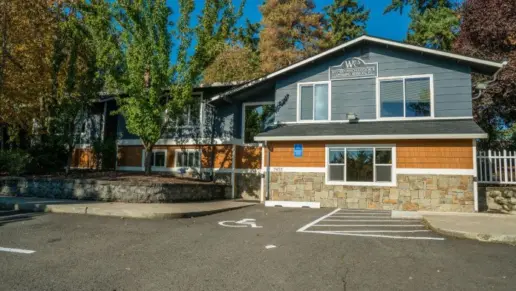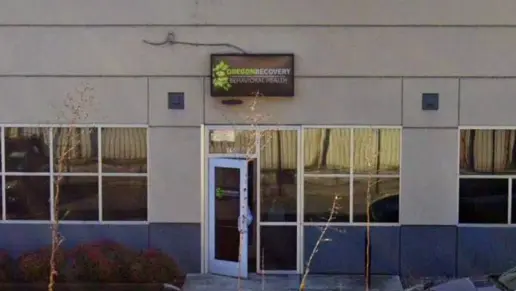I'm so happy with the care I received. This is one of the few programs that are truly affordable for me. And the groups have been a great help for me to stay sober.
About Fora Health — Hillsboro Outpatient and DUII Services
You’ll find Fora Health just 20 miles outside of Portland in Hillsboro, Oregon. Formerly known as De Paul Treatment Centers, they provide outpatient care for adults battling addiction and co-occurring disorders. This location is home to their Hillsboro Outpatient and DUII Services programs.
One great thing I noticed about them is their payment options. You can access treatment with many private and public insurers including the Oregon Health Plan and Medicaid. Even if you don’t have insurance you can still get the help you need. They provide sliding scales based on your financial situation.
With over a 90% satisfaction rate, their modern, spacious facility offers comprehensive care as you live at home. They provide a tailored treatment plan to meet you where you are in recovery. You’ll benefit from individual group therapy sessions to dive deep into the underlying causes of addiction while building recovery skills and connecting with others you resonate with. You can also access peer recovery and family therapy services.
For me, their treatment flexibility really stood out. Many spend between three to six months in their program but the duration of your treatment will depend on your unique needs and goals. You’ll attend about one to eight weekly sessions. Still, you can participate in extended sessions tailored to your preferences. They also offer limited telehealth options to fit treatment seamlessly into your schedule from the comfort of your home.
If you’re facing a DUII charge for driving under the influence then this center can help. They’re a state-certified DUII services provider and can help you address your court ordered requirements through flexible courses, reliable monitoring and other compliance measures.
Another impressive feature I noticed was that their programs are trauma-informed with treatment best practices. You’ll benefit from care that accounts for and addresses past traumatic experiences that can play a role in addiction. You can access support and therapeutic interventions to gain the tools to cope with and overcome these distressing situations.
I also really like their peer recovery services. A peer recovery mentor can connect you with essential local resources and help you develop life skills. With lived experience in recovery, they also represent what life can look like after treatment.
Rehab Score
Gallery

Location
Other Forms of Payment
Medicaid is a state based program that helps lower-income individuals and families pay for healthcare. Medicaid covers addiction treatment so those enrolled can use their coverage to pay for rehab. When a program accepts Medicaid the client often pays very little or nothing out of their own pocket.
Private insurance refers to any kind of healthcare coverage that isn't from the state or federal government. This includes individual and family plans offered by an employer or purchased from the Insurance Marketplace. Every plan will have different requirements and out of pocket costs so be sure to get the full details before you start treatment.
Self-pay involves paying for treatment out of your own pocket. You can use savings or credit, get a personal loan, or receive help from family and friends to fund your treatment. If you don't have insurance or your insurance plan doesn't cover a specific program, self-pay can help ensure you still get the care you need.
Financial aid can take many forms. Centers may have grants or scholarships available to clients who meet eligibility requirements. Programs that receive SAMHSA grants may have financial aid available for those who need treatment as well. Grants and scholarships can help you pai for treatment without having to repay.
Sliding scale payments are based on a client's income and family size. The goal is to make treatment affordable to everyone. By taking these factors into account, addiction recovery care providers help ensure that your treatment does not become a financial burden to you or your family, eliminating one barrier to care.
Addiction Treatments
Levels of Care
Treatments
The goal of treatment for alcoholism is abstinence. Those with poor social support, poor motivation, or psychiatric disorders tend to relapse within a few years of treatment. For these people, success is measured by longer periods of abstinence, reduced use of alcohol, better health, and improved social functioning. Recovery and Maintenance are usually based on 12 step programs and AA meetings.
Drug rehab in Oregon offers a full continuum of care for those struggling with addiction. From detox, to inpatient, to outpatient, to aftercare, Oregon residents can find the support they need for recovery. This treatment empowers individuals to replace drug use with positive alternatives and develop a healthier lifestyle.
Many of De Paul’s clients are in need of treatment for more than just substance use disorders. Mental health evaluations and treatment are available to support clients with a dual diagnosis. Their staff of qualified mental health professionals are equipped to treat a wide range of co-occurring mental health conditions from anxiety and depression to post traumatic stress disorder. Medication management for mental health is available through De Paul’s medical team for their clients.
Opioid rehabs specialize in supporting those recovering from opioid addiction. They treat those suffering from addiction to illegal opioids like heroin, as well as prescription drugs like oxycodone. These centers typically combine both physical as well as mental and emotional support to help stop addiction. Physical support often includes medical detox and subsequent medical support (including medication), and mental support includes in-depth therapy to address the underlying causes of addiction.
Substance rehabs focus on helping individuals recover from substance abuse, including alcohol and drug addiction (both illegal and prescription drugs). They often include the opportunity to engage in both individual as well as group therapy.
Programs



Clinical Services
Cognitive Behavioral Therapy (CBT) is a therapy modality that focuses on the relationship between one's thoughts, feelings, and behaviors. It is used to establish and allow for healthy responses to thoughts and feelings (instead of unhealthy responses, like using drugs or alcohol). CBT has been proven effective for recovering addicts of all kinds, and is used to strengthen a patient's own self-awareness and ability to self-regulate. CBT allows individuals to monitor their own emotional state, become more adept at communicating with others, and manage stress without needing to engage in substance abuse.
Whether a marriage or other committed relationship, an intimate partnership is one of the most important aspects of a person's life. Drug and alcohol addiction affects both members of a couple in deep and meaningful ways, as does rehab and recovery. Couples therapy and other couples-focused treatment programs are significant parts of exploring triggers of addiction, as well as learning how to build healthy patterns to support ongoing sobriety.
The focus of DBT is core mindfulness, a concept you will hear repeated again and again in all your groups and classes. Being mindful is being present to the moment. It is focused, intentional awareness of your thoughts, emotions, and behaviors, non-judgmentally. This class will provide you with concrete skills in each of the core mindfulness areas and help you to maintain your safety. Between classes, you will practice the skills and keep a daily record of their effectiveness using your DBT diary card.
Experiential therapy is a form of therapy in which clients are encouraged to surface and work through subconscious issues by engaging in real-time experiences. Experiential therapy departs from traditional talk therapy by involving the body, and having clients engage in activities, movements, and physical and emotional expression. This can involve role-play or using props (which can include other people). Experiential therapy can help people process trauma, memories, and emotion quickly, deeply, and in a lasting fashion, leading to substantial and impactful healing.
Family therapy is strongly encouraged for all clients. Participation in family therapy has been proven to increase the likelihood of completing treatment and entering long-term recovery. Family therapy services are available to family, friends, and loved ones of those suffering with a substance use disorder.
Group therapy is any therapeutic work that happens in a group (not one-on-one). There are a number of different group therapy modalities, including support groups, experiential therapy, psycho-education, and more. Group therapy involves treatment as well as processing interaction between group members.
In individual therapy, a patient meets one-on-one with a trained psychologist or counselor. Therapy is a pivotal part of effective substance abuse treatment, as it often covers root causes of addiction, including challenges faced by the patient in their social, family, and work/school life.
Life skills trainings involve all the skills a person must have in order to function successfully in the world. These include time management, career guidance, money management, and effective communication. Truly successful addiction recovery is based on the ability to not only live substance-free, but to thrive. Life skills teaches the practical necessities of functioning in society, which sets clients up for success in life, and therefore sobriety.
Motivational Interviewing (MI) is a clinical approach to helping people with substance abuse issues and other conditions shift behavior in positive ways. It is more goal-oriented than traditional psychotherapy, as MI counselors directly attempt to get clients to consider making behavioral change (rather than wait for them to come to conclusions themselves). Its primary purpose is to resolve ambivalence and help clients become able to make healthy choices freely.
Nicotine Replacement Therapy (NRT) is a way of getting nicotine into the bloodstream without smoking. It uses products that supply low doses of nicotine to help people stop smoking. The goal of therapy is to cut down on cravings for nicotine and ease the symptoms of nicotine withdrawal.
Trauma therapy addresses traumatic incidents from a client's past that are likely affecting their present-day experience. Trauma is often one of the primary triggers and potential causes of addiction, and can stem from child sexual abuse, domestic violence, having a parent with a mental illness, losing one or both parents at a young age, teenage or adult sexual assault, or any number of other factors. The purpose of trauma therapy is to allow a patient to process trauma and move through and past it, with the help of trained and compassionate mental health professionals.
Amenities
-
Private Setting
Accreditations

The Commission on Accreditation of Rehabilitation Facilities (CARF) is a non-profit organization that specifically accredits rehab organizations. Founded in 1966, CARF's, mission is to help service providers like rehab facilities maintain high standards of care.
CARF Accreditation: Yes
Contact Information
205 SE 3rd Avenue
Suite 100
Hillsboro, OR 97123


